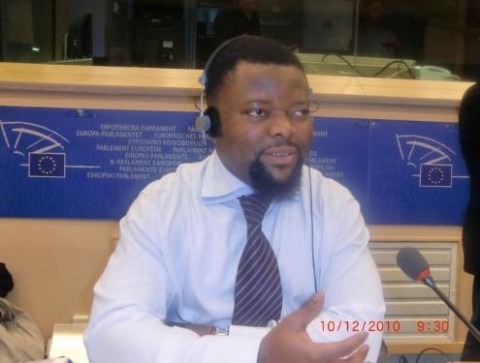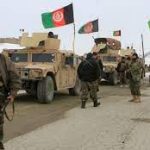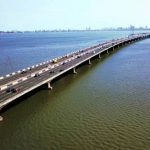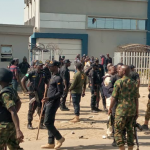We need to flush out corrupt political leaders in Niger-Delta -Comrade Ofehe
Featured, Interview Friday, August 30th, 2013
Comrade Sunny Oghale Ofehe is a Nigerian born social crusader living in The Netherlands.
In wake of the Military clampdown on Pro-democracy activists who were protesting the annulment of the election, and the execution of a renowned author, playwright and a Human Rights activist, Ken Saro-Wiwa and others popularly known as the Ogoni Nine(9), Comrade Ofehe fled Nigeria for the Netherlands where he sought political asylum on the 26th November 1999.
In 2005, Comrade Ofehe founded a non-governmental Organization, Hope for the Niger Delta Campaigns (HNDC) in Rotterdam, Netherlands.
HNDC’s objective is to set a new paradigm for restoration of Hope and the establishment of a peaceful Niger Delta safe for the host communities, multi-nationals, the International Community and other stakeholders.
In this interview Comrade Ofehe speaks passionately about the problem of the Niger Delta and the activities of his group, Hope for the Niger Delta.
Excerpts:
When and how did you come about with the formation of this organization, Hope for Niger Delta Campaign?
I arrived The Netherlands precisely the 27th of November 1995, and after living in the country for many years and finding out that despite Shell International being headquartered in The Hague, The Netherlands, many of the people including the press didn’t know much about what was happening in the Niger Delta with respect to the environmental impact as a result of Shell Nigeria oil operations in the Niger Delta region.
As an activist from the Niger Delta who has experienced the environmental impact and human rights abuses resulting from oil operations in the region, which have only benefited the Nigeria government and the oil giants with untold hardship on the people whose environment has been greatly damaged, I felt the need to initiate a campaign to raise much awareness on the untold sufferings of
the Niger Delta people in The Netherlands.
It would be recalled that after the 2003 elections in which greedy politicians freely spread weapons among youths to violently win the flawed elections, it was clear that the Niger Delta was heading towards another violent phase. This further reinvigorated my resolve to begin a campaign within The Netherlands. I needed an official platform to carry out this campaign and decided that setting up a nongovernmental organization will help lend the voice that the region needs internationally.
Hope for Niger Delta Campaign (HNDC) was eventually founded in 2005 in Rotterdam. The organization has since then grown from strength to strength with much awareness already raised. We are not relenting as much effort is being made to expand the campaign to other European countries through much participation in the EU activities.
As a Nigerian in the Netherlands, what was the perception and impression of the Dutch about you and the organization in the early stage and now?
At the beginning, as a Nigerian trying to spearhead this daunting task was not easy. I had to fight many stigmatized factors. The only story that gets air attention in The Netherlands has always been how Nigerians are involved in the scam business (419) and banks related frauds. Nigerians have been profiled to be dubious and criminal.
These factors affected the early stages of my campaign as many people saw it as being backed by fraudulent intensions. When you attended meetings, you were confronted with the issue of trust and most readily prepared to be turned down. Whenever you raised any initiative, your background is quickly checked and when it’s known that you are a Nigerian, you are quietly alienated.
I was determined to prove that in as much as I will agree that few Nigerians are involved in vices inimical to the image of our country, there are still many descent and hardworking Nigerians scattered all over the world. I never allowed the stigma to weigh me down and kept believing in the cause. I felt a sense of God’s hand in the cause, because I was surprised at how all the obstacles were being outmanoeuvred.
I have always grown up knowing that no success is achieved without first overcoming the challenges and in this case the challenges were fighting the stigma of being a Nigerian. My determination paid off after I was scrutinised by many and they all found out that my agitations were genuine and devoid of any unscrupulous and dubious tendencies.
Today, I feel very satisfied looking back at those horrible beginnings and also using my campaign to prove to Nigerians that your genuine actions can most times help to improve the already battered international image of our great country Nigeria. Today, I see myself as not only fighting the Niger Delta cause in the most nonviolent and peaceful way but also helping to raise the standard of how Nigerians are being looked upon outside Africa.
The struggle for resource control has been on for a very long time now, do you believe it can be realized?
I am a strong supporter of resource control but with a very simple condition that the leadership of the Niger Delta region must first free themselves off the hands of our current corrupt political leaders. The biggest corruption in the Nigeria polity today is taking place in the Niger Delta!
We must realise that apart from the statutory federal allocation to all Nigerian States, the Niger Delta also receive 13% derivation from profit made in crude oil extraction. Can we now say that the Niger Delta States have seen more development since they started receiving this increase in federal allocations? The answer is capital NO! Where is the money and what has been done so far? The budget of River State alone is higher than that of many African countries. Is there anything in River State that you can see today that equates what they get from the Federal government? What about Bayelsa and even my own Delta State?
Is there any political leader today in any of the Niger Delta States that can stand out with transparent honesty and say he is corrupt free? When names like the Odilis, Iboris, Igbinedions, Alamaseighas and other past Ministerial nominees from the Niger Delta are mentioned, what readily comes to people’s mind is corruption and greed.
I have been told by many people that we need an increase in derivation from the current 13% to a minimum of 25%. I am a proponent of this increase only on the basis of proper utilisation of the current 13% otherwise we will be fighting an increase that will only swell the pockets of the few current oligarchs.
We can only achieve and win the battle for resource control if we can prove to other parts of the country that we are ready for zero tolerance when it comes to corruption. Its election period now and I hope we can vote for the right candidates who will have the ordinary people in mind and rule with the fear of God knowing that service to the people is service to God. Until then, the call for resource control should not be our ultimate goal for now. The people of the Niger Delta are not ready yet until we flush ourselves of the greedy political
leaders that we now have.
The coming of oil companies to the Niger Delta region has undoubtedly affected the lives of the people in that region negatively. Their farm lands and water have been destroyed as a result of oil spillages. To you, what is the way out of this inhuman treatment?
It is simple, first the oil multinational companies must realize that people exist where they extract oil and as such must conform to internationally accepted standards of operation. It is sad to see oil pipelines that dates back to early 60s and 70s still crisscrossing the Niger Delta and most are running above ground. This is against internationally set standards and must be rejected.
These oil majors cannot dare this same practice in their home countries otherwise their operating licenses will be withdrawn and contracts revoked. These are the major causes of oil spillages but the role of sabotage cannot be denied also. The companies’ responses to spills from oil leakages and sabotage must be swift and prompt to avoid devastating environmental consequences.
It is a known fact that the oil companies complain of violent youths preventing them from getting access to such sites to carry out remediation. This is always the excuse when such locations are not of huge commercial benefits but when it affects a major money spinning pipelines, they know how to get there with the escort of military (JTF) backed security teams.
The Nigerian government is also bearing much of the blames as most of their environmental impact assessment agencies are failing in their duties to report and punish companies when they fail to exercise their duties of remediation.
In summary, old pipes must be replaced and buried underground. The government must carry out a proper oversight using their agencies. The communities must have greater involvement in the oil sector by having employments which will create a sense of involvement. When the youths in oil bearing communities have direct or indirect participation, it will reduce the risk of pipelines sabotage.
Gas flaring is one of the greatest problems in the Niger Delta region. What is the remedy to this wastage?
Millions of dollars are wasted every year by the oil companies from the burning of associated gasses in the Niger Delta. The oil companies prefer to burn this gasses because it is cheaper and economical for them. In Western countries, these are often used as domestic gasses supplied to homes.
This flaring and venting processes produces more greenhouse gas emission than any other single source in sub Saharan Africa. This flaring of poisonous gasses is responsible for the chronic health and environmental problems affecting the people of the Niger Delta region.
There has been a ban on gas flare in Nigeria since the early 1980s but the oil companies have consistently shifted the end date since then and the government have lacked the political will to enforce this ban.
During my recent visit to the Niger Delta with a Dutch Member of Parliament, I was told by her that Shell took her to a project that is aimed at reducing gas flaring by as much as 70% in the coming years. I cannot comment on this because Shell refused my presence in that visit for reasons that are still not very convincing.
The current Liquefied Natural Gas (LNG) project is a good solution. The wasted gasses can be channelled into production of energy which the country currently lacks. What about helping the communities and urban areas with domestic gas burners and sending part of it for domestic cooking use?
For the sake of the health consequence of gas flaring, it must end now! I visited Oben Community with the Dutch MP and I remember how she felt coming close to the heat from the flare. She asked, how long has this been flaring like this? The Youth leader of the Community answered, “since 1972,”and she was shocked. The people of the community have lived with that flare for 38 years!
Must we trade the health of our people for oil profit? Those who are even benefitting from the oil don’t even live anywhere close to feel the environmental impact and health consequences. Who is playing God here?
Who should be held responsible for the unending crises in that region, is it the government, oil multinational companies or the traditional rulers?
I always say that the blames and responsibility are tripod; the Nigerian government, the oil multinational companies and the local leaders under which the traditional rulers fall.
The Oil companies cannot continue to mess the environment without the supportof the Nigerian government. Remember, they are in a Joint Venture agreement and the oil companies are the operators of this joint venture. When the oil companies continue to operate at their whims and caprices and the government lacks the political will to regulate and enforce the basic tenets that guides their operations, it then means they are Siamese twins collaborating to milk the environment at the expense of the health and livelihood of the people.
The local leaders have been torn apart by greed and corruption. The oil companies practice of divide and rule which tends to divide community leaders have also heightened the crisis in the region. This has been responsible for clashes among separated communities.
Honesty and transparency amongst these three tiers will help alleviate the causes of the crisis and becomes the home run for a sustainable peace in the region.
Do you see the Federal Governments Amnesty programme as a genuine one?
The intensions of the Late President Yar’Adua were clear. He was honestly committed to resolving the problems of the region with his Amnesty programme but I think he had around him people who were out to use the process to achieve their greedy political goals.
When you look at how the budget for the Amnesty program was arranged, you will see that most of the funds were geared towards their own benefits and very little was left for the implementation of the programme.
The process seems to be disguised success at the moment because certain people are receiving money to abstain from practices inimical to its success. The moment the flow of this money stops, we will see escalation of violence again. Look at what happened in the case of John Togo, he got dissatisfied with the process and went back to the creeks and we have all seen what the results have been.
I think with the exit of Timi Alaibe the body should be re-organised. Fresh blood should be injected and they should be monitored by international crisis monitory experts preferably the UN or EU. Much emphasis should be placed on the re-integration phase and community development programmes, and youth empowerment structure should be implemented. When this is done, the public confidence can now grow and the programme will begin to yield dividends.
Some people from the region have argued that they do not need Amnesty because they did not do anything wrong but only agitating for their rights in the struggle. What is your take on this argument?
If there is one man I have respects for, it’s Alhaji Mujahid Asari Dokubo. We might differ in our opinions on how we see the Niger Delta problems but I see him as a man who has passion for the region. He is one person that spoke openly against the programme and refused to take part backing his argument with your question.
I think the issue of crime before amnesty shouldn’t arise at all. We understand that in the process of their militancy they ran against the law and ordinarily would have been charged for some offences. The idea behind the amnesty is to sound a wakeup call and say listen, whatever you may have done wrong is forgiven. Come out clean and let’s find a way to resolve the differences.
The process gave them the chance to be “born again” and come out without facing any prosecution. I support the amnesty programme but very much against how it’s been managed. The programme still has the chance of recording success.
We must not forget that the Niger Delta Technical Committee Reports headed by Mr. Ledum Mitee still holds the key to the overall success of any programme. This is because it encompasses all the nitty gritty of the region and of which the amnesty programme is just one of the many recommendations.
As somebody from this region, how do you feel when you see these things happening to your people as the major producers of the nation’s wealth?
I feel deeply saddened and more so very depressing when I see how oil extraction is taking place here in The Netherlands where I live. I will echo the voice of Hillary Clinton again when she said she cannot understand why a country like Nigeria which is one of the largest producer of crude oil still import crude products from outside its country.
We live in penury and yet we are considered an oil giant. The country has enjoyed oil boom for many years and yet we still live under $1 dollar per day which is World Bank definition of poverty. After more than 5 decades of over reliance on oil revenue we must have a paradigm shift from the status quo and begin to set our country in line with the emerging economical giants like China and India.
The government of Nigeria must begin to look in the direction of other naturally endowed resources for income generation. This is vital now in the time when the world powers are looking at alternative source of energy dependence.
We must learn from Malaysia who once relied on timber importation from Nigeria and today are the largest producers and suppliers of timber to the world. Whatever runs must one day dry up. I still believe that we have the chance for a better Nigeria and it is that believe that is motivating me to do my bit as a Diaspora who has not forgotten his home country.
God bless the Federal Republic of Nigeria.
Related Posts
Short URL: https://www.africanexaminer.com/?p=157




















